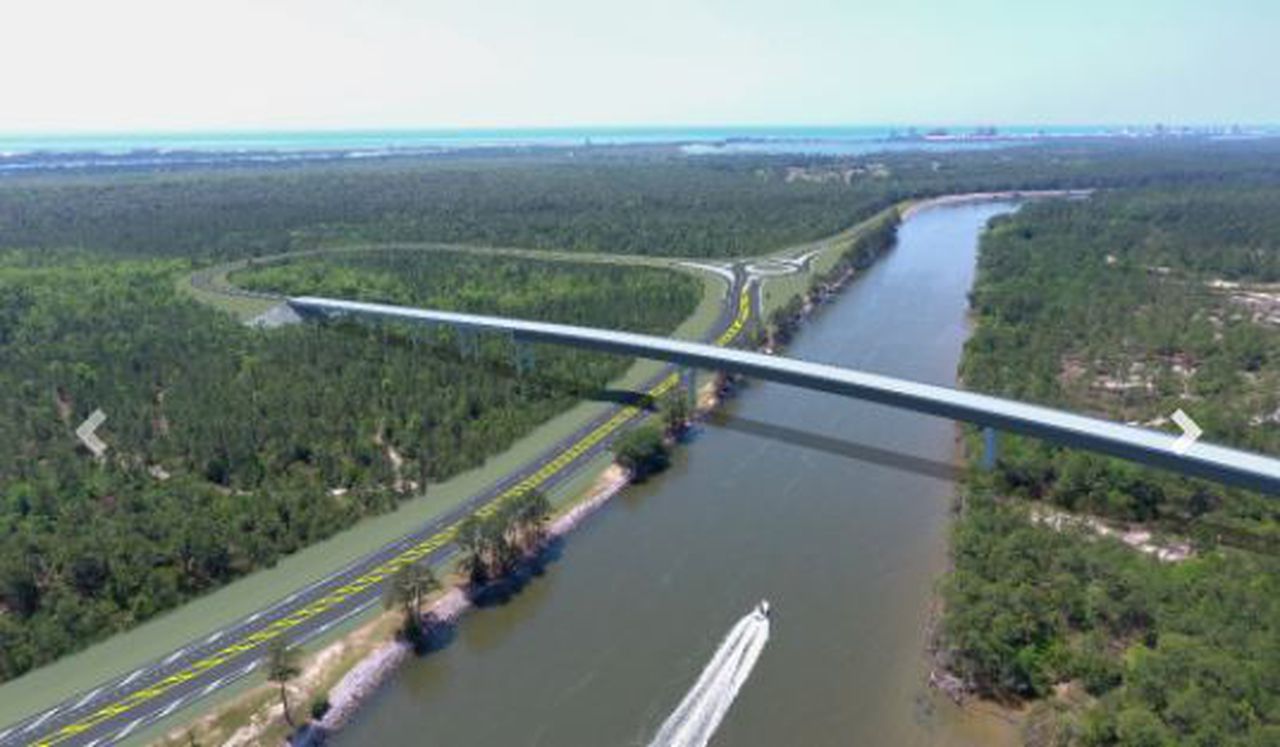Gov. Kay Ivey praises Gulf Shores bridge decision
Alabama Gov. Kay Ivey said Monday she is glad to see a ruling from the state Supreme Court that allows for the resumption of the construction of a two-lane bridge over the Intracoastal Waterway in Gulf Shores.
“It’s great for Baldwin County, and the state as a whole,” Ivey said after delivering a speech during an annual state tourism conference Monday at The Grand Hotel in Point Clear.
“I’m real proud government in Alabama can get back to building roads and bridges,” Ivey added. “And the courts can stay in their lane.”
When asked if she believes the courts will continue to “stay in their lane,” she responded, “I sure do.”
The case may not be over with. The plaintiffs in the lawsuit – the Baldwin County Bridge Company (BCBC), owners and operators of a toll bridge in Orange Beach near The Wharf and approximately 1.1 miles east of the new Gulf Shores bridge – hinted they might pursue an inverse condemnation claim against the Alabama Department of Transportation.
If the claim is pursued, it would likely go back before a judge in Montgomery County later this fall. The claim could establish a financial remedy for BCBC related to valuation damages to their toll bridge with the construction of the nearby Gulf Shores bridge.
“The court recognized that BCBC has a viable inverse condemnation claim for money damages for the effective taking of its property that can proceed in the trial court,” said BCBC president Neal Belitsky.
A rendering of the future Intracoastal Waterway Bridge that connects the Foley Beach Express to Gulf Shores, Ala. (rendering provided by the Alabama Department of Transportation).
Ivey’s administration has been the focus of months-long court case that made its way to the Alabama Supreme Court over the fate of a state-backed bridge in Gulf Shores.
The Alabama State Supreme Court’s ruling on Friday claimed that a lower court judge erred in halting the bridge’s construction in May, and reversed a preliminary injunction issued by Montgomery County Circuit Judge Jimmie Pool. His ruling temporarily placed the entire $100 million-plus bridge project in limbo.
BCBC argued that Ivey’s transportation director – John Cooper, who heads up the Alabama Department of Transportation – acted in “bad faith” during negotiations with them ahead of rewarding a contract to the Scott Bridge Co. for the Gulf Shores project.
BCBC, about one year ago, pushed for Cooper to consider an alternative proposal from them that would have prohibited new bridge construction for about 50 years, but also included waiving toll fees for county residents. After Cooper rejected their proposal, the company sued the director in his official capacity as ALDOT’s director.
Pool, following a seven-day bench trial, ordered the project be halted and derisively called it the “Cooper bridge.” The Supreme Court, in reversing Pool’s decision, said Cooper enjoys state constitutional protection that gives him – as a state agency director – “absolute immunity” from being sued.
Cooper, during testimony in Montgomery, claimed that he had no direct conversations with the governor over his final decision to pursue the Gulf Shores bridge project. He instead communicated chiefly with Ivey’s former and current chiefs of staff.
The conversations with Ivey’s chiefs of staff were the heart of an executive privilege case that was also before the Supreme Court. The issue focused on whether text messages and other communications between Cooper and the chiefs of staff – Jo Bonner and Liz Fillmore – should be shielded from public viewing.
The Court, in its ruling Friday, determined that since Pool did not have jurisdiction based on State immunity, his previous order for Cooper to produce the intraoffice communications was “moot.”
